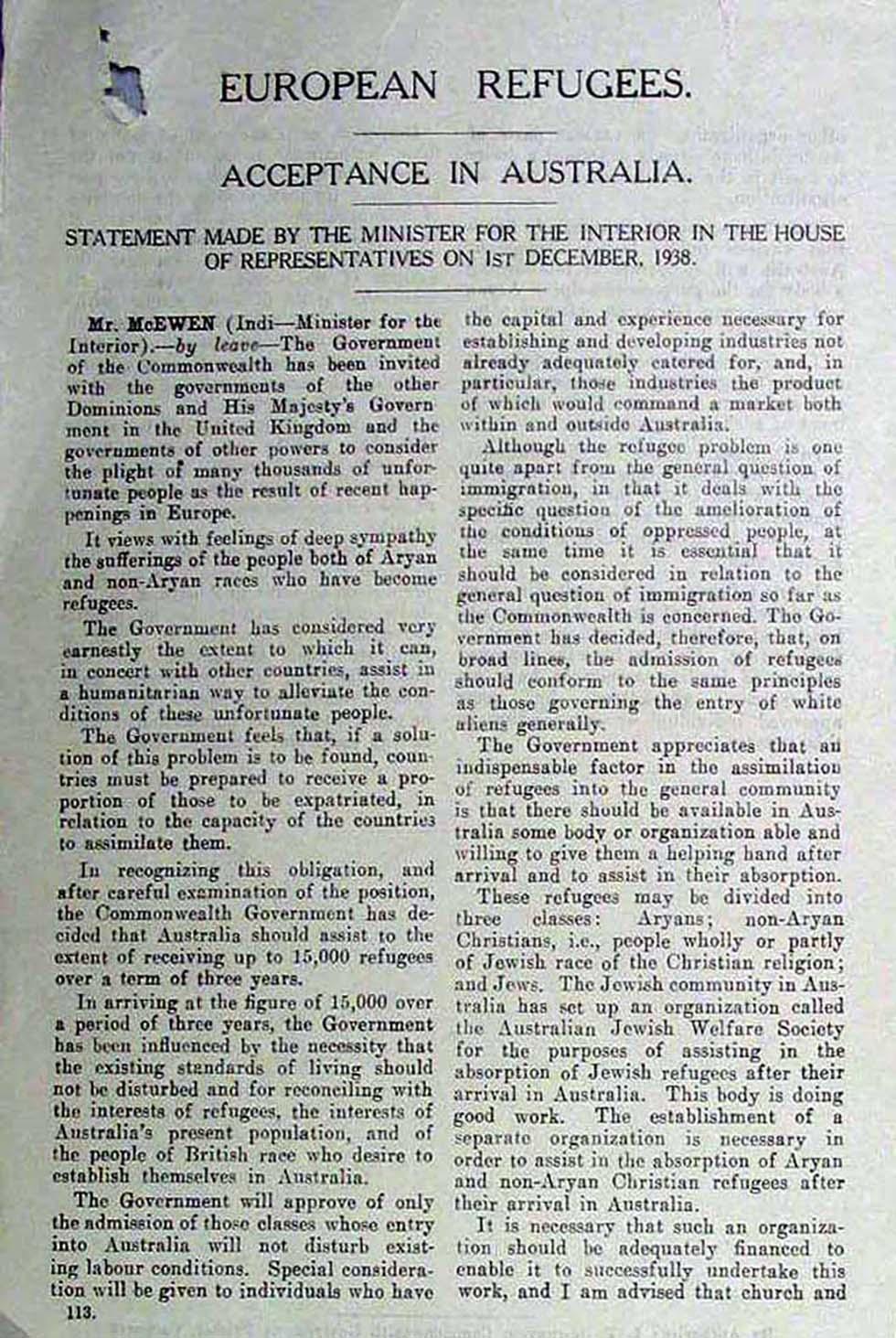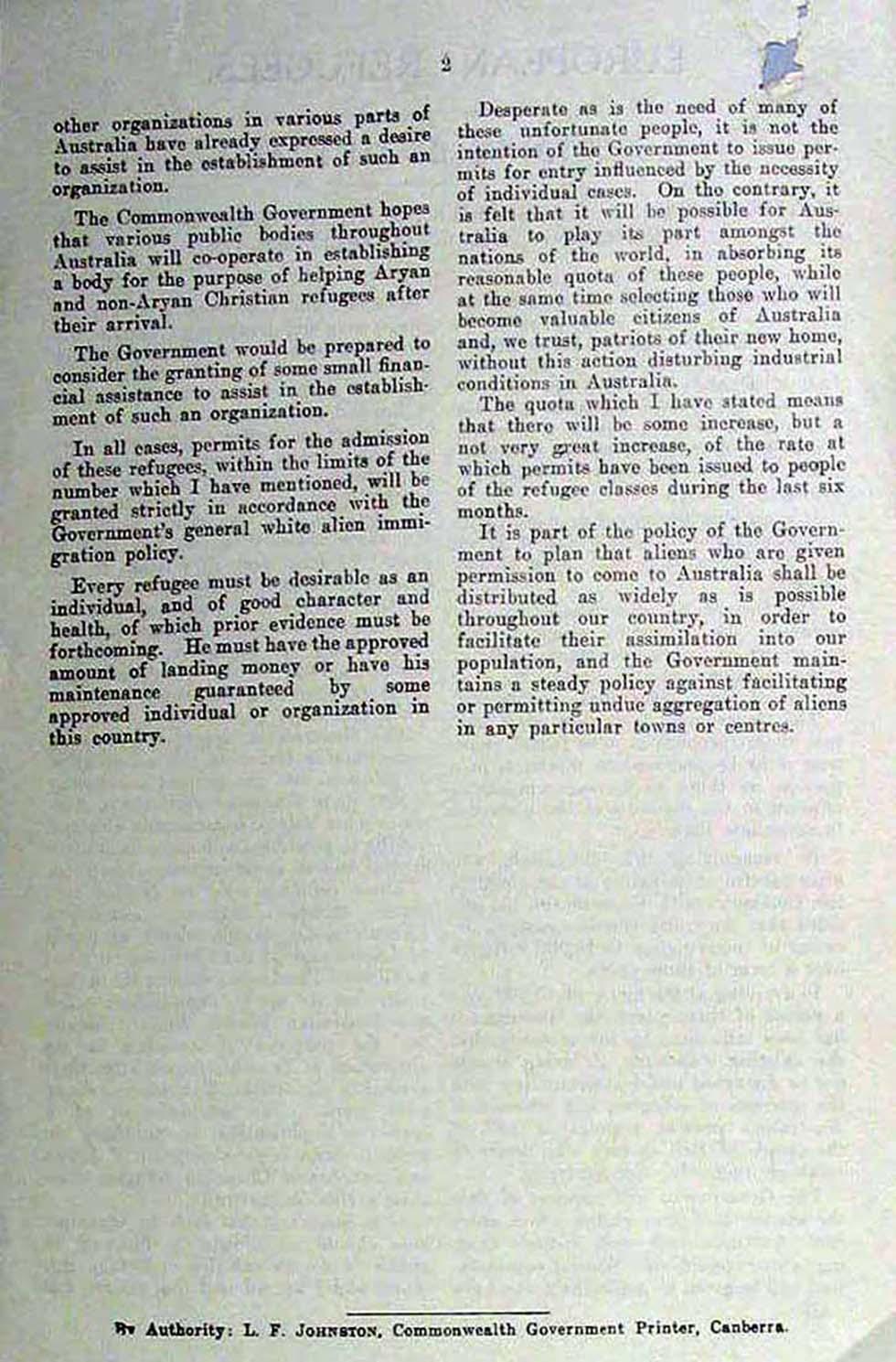
Statement made to the House of Representatives

Statement made to the House of Representatives
Aboriginal and Torres Strait Islander people should be aware that the National Archives' website and collection contain the names, images and voices of people who have died.
Some records include terms and views that are not appropriate today. They reflect the period in which they were created and are not the views of the National Archives.


Statement made to the House of Representatives

Statement made to the House of Representatives
[Page 1]
[Heading;] EUROPEAN REFUGEES
[Subheading:] ACCEPTANCE IN AUSTRALIA
[Subheading:] STATEMENT MADE BY THE MINISTER FOR THE INTERIOR IN THE HOUSE OF REPRESENTATIVES ON 1ST DECEMBER, 1938.
Mr. McEWEN (Indi—Minister for the Interior).—by leave— The Government of the Commonwealth has been invited with the governments of the other Dominions and His Majesty’s Government in the United Kingdom and the governments of other powers to consider the plight of many thousands of unfortunate people as the result of recent happenings in Europe.
It views with feelings of deep sympathy the sufferings of the people both of Aryan and non-Aryan races who have become refugees.
The Government has considered very earnestly the extent to which it can, in concert with other countries, assist in a humanitarian way to alleviate the conditions of these unfortunate people.
The Government feels that, if a solution of this problem is to be found, countries must be prepared to receive a proportion of those to be expatriated, in relation to the capacity of the countries to assimilate them.
In recognizing this obligation, and after careful examination of the position, the Commonwealth Government has decided that Australia should assist to the extent of receiving up to 15,000 refugees over a term of three years.
In arriving at the figure of 15,000 over a period of three years, the Government has been influenced by the necessity that the existing standards of living should not be disturbed and for reconciling with the interests of refugees, the interests of Australia’s present population, and of the people of British race who desire to establish themselves in Australia.
The Government will approve of only the admission of those classes whose entry into Australia will not disturb existing labour conditions. Special considerations will be given to individuals who have the capital and experience necessary for establishing and developing industries not already adequately cared for, and, in particular, those industries the product of which would command a market both within and outside Australia.
Although the refugee problem is one quite apart from the general question of immigration, in that it deals with the specific question of the amelioration of the conditions of oppressed people, at the same time it is essential that it should be considered in relation to the general question of immigration so far as the Commonwealth is concerned. The Government has decided, therefore, that, on broad lines, the admission of refugees should conform to the same principles as those governing the entry of white aliens generally.
The Government appreciates that an indispensable factor in the assimilation of refugees into the general community is that there should be available in Australia some body or organization able and willing to give them a helping hand after arrival and to assist in their absorption.
These refugees may be divided into three classes: Aryans; non-Aryan Christians, i.e., people wholly or partly of Jewish race of the Christian religion; and Jews. The Jewish community in Australia has set up an organization called the Australian Jewish Welfare Society for the purposes of assisting in the absorption of Jewish refugees after their arrival in Australia. This body is doing good work. The establishment of a separate organization is necessary in order to assist in the absorption of Aryan and non-Aryan Christian refugees after their arrival in Australia.
It is necessary that such an organization should be adequately financed to enable it to successfully undertake this work, and I am advised that church and
[Page] 2
other organizations in various parts of Australia have already expressed a desire to assist in the establishment of such an organization.
The Commonwealth Government hopes that various public bodies throughout Australia will co-operate in establishing a body for the purposes of helping Aryan and non-Aryan Christian refugees after their arrival.
The Government would be prepared to consider the granting of some small financial assistance to assist in the establishment of such an organization.
In all cases, permits for the admission of these refugees, within the limits of the number which I have mentioned, will be granted strictly in accordance with the Government’s general white alien immigration policy.
Every refugee must be desirable as an individual, and of good character and health, of which prior evidence must be forthcoming. He must have the approved amount of landing money or have his maintenance guaranteed by some approved individual or organization in this country.
Desperate as is the need of many of these unfortunate people, it is not the intention of the Government to issue permits for entry influenced by the necessity of individual cases. On the contrary, it is felt that it will be possible for Australia to play its part amongst the nations of the world, in absorbing its reasonable quota of these people, while at the same time selecting those who will become valuable citizens of Australia and, we trust, patriots of their new home, without this action disturbing industrial conditions in Australia.
The quota which I have stated means that there will be some increase, but a not very great increase, of the rate at which permits have been issued to people of the refugee classes during the last six months.
It is part of the policy of the Government to plan that aliens who are given permission to come to Australia shall be distributed as widely as is possible throughout our country, in order to facilitate their assimilation into our population, and the Government maintains a steady policy against facilitating or permitting undue aggregation of aliens in any particular towns or centres.
[Footer:] By Authority: L. F. JOHNSTON, Commonwealth Government Printer, Canberra.
Learn how to interpret primary sources, use our collection and more.
